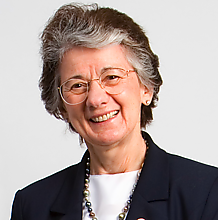All News
Colwell Awarded 2017 International Prize for Biology

Rita Colwell, a Distinguished University Professor in the University of Maryland Institute for Advanced Computer Studies (UMIACS), has been named the 2017 laureate of the International Prize for Biology for her outstanding contributions to marine microbiology, bioinformatics and the understanding and prevention of cholera.
Colwell is the 33rd recipient of this award, generally recognized as one of the most prestigious honors a natural scientist can receive. Past laureates include renowned biologists such as John B. Gurdon, Motoo Kimura, Edward O. Wilson, Ernst Mayr and Thomas Cavalier-Smith.
In awarding the prize, Japan’s Society for the Promotion of Science honored Colwell as a pioneer in the use of computational tools and DNA sequencing to identify and classify marine bacteria and other microorganisms, work that helped lay the foundation for the bioinformatics revolution.
The prize also recognizes Colwell’s life-saving contributions to the understanding and prevention of cholera, an acute diarrheal disease, caused by ingestion of water or food contaminated with Vibrio cholera, which according to the World Health Organization is responsible for approximately 1 to 4 million illnesses and 20,000 to 140,000 deaths each year.
Colwell, whose career bridges the disciplines of microbiology, ecology, infectious disease, public health and computer and satellite technology, continues to be a leader in bioinformatics, notably in understanding microbiomes and the application of this knowledge to human health and the diagnosis and treatment of disease. This includes her current work as founder and chairman of CosmosID Inc., a microbial genomics company focused on molecular diagnostics of human pathogens and antimicrobial resistance.
“It is an extraordinary honor to be named recipient of the International Prize for Biology, a very special honor for a biologist,” said Colwell. “I am deeply grateful to the Japan Society for the Promotion of Science for this award. I have many friends and colleagues in Japan and look forward to continuing my many collaborations with them.”
The selection committee also cited Colwell's transformational work in these areas:
- Establishing the taxonomy of vibrio bacteria, which includes Vibrio cholerae.
- Identifying a previously unknown survival strategy of dormant vibrio cells, which the committee said "has had a profound influence on microbiology and medicine.”
- Showing how climate change has expanded the habitat range of vibrios, and the occurrence of cholera.
- Helping prevent the spread of cholera in developing countries by discovering and demonstrating an effective way to use the sari, the traditional dress of women on the Indian subcontinent, as a filter to remove vibrio-carrying plankton from drinking water drawn from ponds, rivers and other surface waters.
The International Prize for Biology was instituted in April 1985 by the Committee on the International Prize for Biology. The prize, consisting of a certificate, a medal and an award of 10-million yen (more than $90,000) is given to the recipient, along with an imperial gift, a silver vase bearing the imperial crest. The award presentation ceremony and a subsequent reception in honor of Colwell will held in late 2017 at the Japanese Academy in Japan.
Pop Delivers Keynote Talk at International Conference on Bioinformatics
Mihai Pop, professor of computer science and interim director of UMIACS, is a featured keynote speaker this week at the German Conference on Bioinformatics.
The annual conference—held this year in Tübingen, Germany—attracts a multinational audience of 200–250 participants. The meeting is open to all fields of bioinformatics and serves as a collaborative platform for the European bioinformatics community.
Pop’s talk will center on the computational analysis of microbial communities. He will discuss some of the recent results from his lab—focusing on both experimental and computational challenges—as well as how microbes can impact human health.
Pop will also highlight his lab’s work in using computational biology to study the causes of diarrhea in the developing world, as well as his group’s research on the testing and validation of genome assembly software.
UMD Computational Biologists Michael Cummings and Daniel Ayres win NVIDIA Global Impact Award
Spring 2017 CAMI2 hackathon on May 3rd to May 5th
CBCB will be hosting a 3-day CAMI2 hackathon on Wednesday, May 3rd through Friday, May 5th at the University of Maryland (in Biomolecular Sciences Bldg, room 3118).
This will be a joint event with the Mid-Atlantic Microbiome Meetup (M3). This event precedes the CAMI+M3 workshop taking placing on May 7th to May 8th at the University of Maryland (STAMP).
The registration website is online at: https://www.regonline.com/m3cami
For more information, please see: http://blog.umd.edu/m3/upcoming-events/2017-spring-m3/
Spring 2017 Mid-Atlantic Microbiome Meetup (M3) on May 7th and May 8th
We are happy to announce that the Spring 2017 Mid-Atlantic Microbiome Meetup (M3) registration website is now online at: https://www.regonline.com/m3cami
This will be a joint event with CAMI (www.cami-challenge.org) and is taking place on May 7th & 8th (2017) at the University of Maryland (STAMP).
For more information on this meetup, please see: http://blog.umd.edu/m3/upcoming-events/2017-spring-m3
CBCB scientist Rita Colwell is named a Fellow in the National Academy of Inventors
CBCB scientist Erez Persi publishes a paper in Nature Communications on evolution of repeats in proteins
CBCB faculty and lead author Erez Persi has published a paper titled “Positive and strongly relaxed purifying selection drive the evolution of repeats in proteins” in Nature Communications on November 18, 2016.
In this paper, horizontal evolution of repeats is shown to be markedly accelerated compared with their divergence from orthologues in closely related species. This observation is universal across the diversity of life forms and implies a biphasic evolutionary regime whereby new copies experience rapid functional divergence under combined effects of strongly relaxed purifying selection and positive selection, followed by fixation and conservation of each individual repeat.
